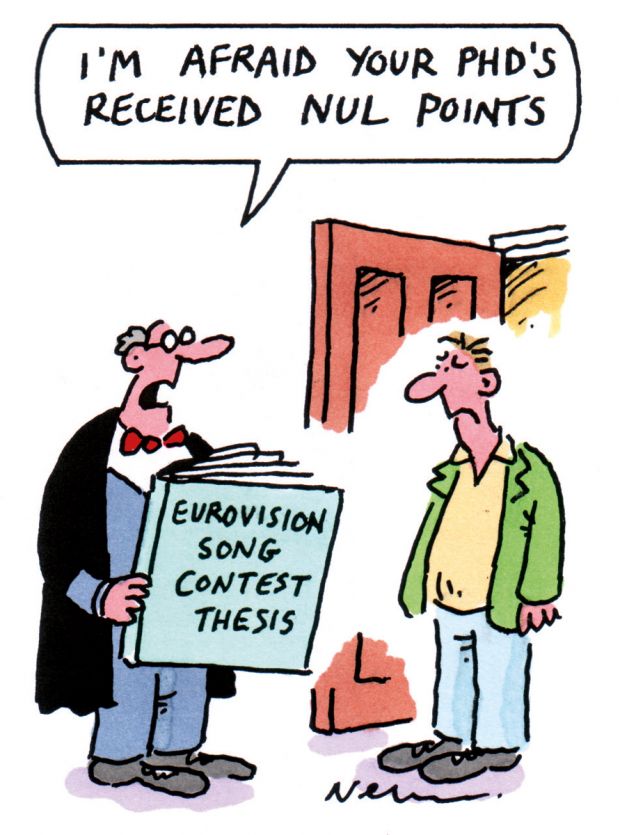
- A PhD researcher is to examine why the UK has fared so badly at the Eurovision Song Contest in recent years, the Manchester Evening News reported on 10 April. Jamie Halliwell, a doctoral student in Manchester Metropolitan University’s human geography department, will question BBC judges, music industry figures and fans to try to figure out what has happened since crowd-pleasing numbers such as Boom Bang-a-Bang and Puppet on a String scored notable wins, the paper said. Mr Halliwell will fly to Copenhagen next month to interview fans at the contest on their perceptions of British entries. With impresario Lord Lloyd-Webber, reformed boy band Blue and veteran crooner Engelbert Humperdinck having failed to turn around our fortunes in recent years, it seems that academic research might now be our only hope of regaining former glories.
- This month’s all-male University Challenge final does not reflect any macho culture at work in UK higher education, one of the winning contestants has claimed. While the woman-free line-up, dubbed the “starter for men”, drew criticism from classicist Mary Beard, comedian Al Murray and many others, Filip Drnovšek Zorko from Trinity College, Cambridge’s winning team laid the blame at society’s door, The Daily Telegraph reported on 13 April. “I feel bad about this, but it’s not the fault of any one team, rather the society which abuses any woman who dares to excel,” said Mr Drnovšek Zorko, the nephew of the late Slovenian president Janez Drnovšek.
- Actress Maureen Lipman has hit back at Nigel Farage after the Ukip leader blamed her for too many young people studying poor-quality degrees at university, The Telegraph website reported on 13 April. Her appearance in a 1980s British Telecom advert, in which she tries to perk up her grandson over his failed exams by congratulating him on achieving an “ology” (sociology), was cited by Mr Farage as one of the reasons why lots of students were now “getting ‘ologies’ ”, rather than “learning skills and trades”. “Having spent so long in politics, Mr Farage finds himself unable to differentiate between fact and fantasy,” said Ms Lipman, suggesting that he enrol in a “soft media studies degree and change careers to become a fully fledged comic”. “Since he must be the first senior politician in the history of the first world nations to regard education as a bad thing, he is well on the way to a place on Mock the Week,” she concluded.
- Tributes were this week paid to Richard Hoggart, one of the most influential academics of his generation, who died at the age of 95. Professor Hoggart, widely regarded as one of the pioneers of cultural studies, was professor of English at the University of Birmingham from 1962 to 1973, and he gave evidence as a defence witness when the publisher of D. H. Lawrence’s Lady Chatterley’s Lover was prosecuted for obscenity in 1960. The Guardian devoted most of its letters page to the “late, great Richard Hoggart” on 14 April, although one correspondent, Jad Adams, took issue with the paper’s assertion in its obituary that his decision to become warden of Goldsmiths, University of London was a “diminuendo” to his career. “He expanded the institution out of recognition with the application of his restless energy, intellectual rigour, exceptional contacts and many hours in committee work,” said Mr Adams. “Goldsmiths is now a world-class institution” and a “monument” to Professor Hoggart’s achievements, he added.
- A US university criticised for stocking “gay-themed literature” has hit back after it was again attacked for allegedly promoting homosexuality, the website PinkNews reported on 13 April. The University of South Carolina Upstate was accused last week by Republican senator Mike Fair of “recruiting” lesbians after a satirical show, How to Become a Lesbian in 10 Days or Less, was due to be performed there. It follows state cuts worth £10,000 instigated by Republicans – a symbolic sum to represent the amount spent on “gay-themed” books. However, USCU chancellor Tom Moore has rejected the allegations that there is an “agenda” to promote gay lifestyles on campus. “We must engage with important issues in our culture, even when doing so makes some uncomfortable,” Dr Moore said.
